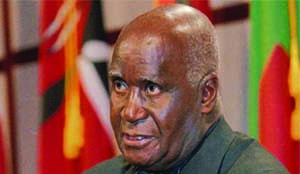By AUSTIN KALUBA – ZAMBIA became the ninth African State to gain independence from the British crown in October, 1964.
The former colony of Northern Rhodesia – part of the Federation of Rhodesia and Nyasaland since 1953 – celebrated with a ceremony at the Independence Stadium in the capital, Lusaka, as a huge copper torch was lit on a hill overlooking the city.
The new president of the country, Kenneth Kaunda, was given the Instruments of Independence by the Queen’s representative, the Princess Mary.
Thousands of people shouted “Kwacha!” – meaning the Dawn – as they watched the red, black, green and orange colours of the Zambian Republic’s flag replace the British Union Jack to mark the official changeover at midnight.
Princess Mary read a personal message from the Queen as the UK welcomed the newest member of its Commonwealth.
Kaunda’s vision
President Kaunda – the only candidate in the August elections – gave his first news conference since taking office.
He spoke of the new republic’s “task of building a nation founded on respect for all people of all races, all colours and all religions”.
He told journalists that Zambia would not support Britain if neighbouring Rhodesia – formerly Southern Rhodesia – made a unilateral declaration of independence.
“That declaration would meet resistance from all over the world and would not last,” he said.
The son of a Church of Scotland minister, Dr Kaunda, then 40 years old, had a reputation as a moderate and reasonable man, opposed to violence.
He supported the preservation of 10 of the 73 seats in parliament for the Europeans, for at least the next four years.
He hopes this will reassure the community of 70,000 Europeans in Zambia, most of whom worked on the Copperbelt near the border with Congo and are of great economic importance to the country.
Many had already left for South Africa fearing increased African resentment against them.
One of Dr Kaunda’s first acts as head of state was to release 200 “freedom fighters” jailed for sedition by the colonial administration.
He had also sent letters to the South African Prime Minister asking for African leaders, including Nelson Mandela, to be imprisoned in Zambia rather than their homeland.
Lusaka was home to the headquarters of 15 African freedom movements, including ZANU and ZAPU from Rhodesia.
–Courtesy of the BBC-On this day.







